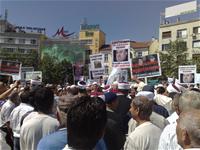The protests - ways of usage
Adelina Marini, August 3, 2010
 While I was walking toward the Council of Ministers of Bulgaria on Thursday (July 29) I came across a demonstration in front of the Parliament. My attention was attracted by the huge number of buses, parked at the municipal parking in front of the Royal Palace in the centre of Sofia. I wondered what was going on since the entire parking-lot must be closed for cars in a working day and, instead, buses from all over the country to be allowed to park there. And while I was wandering around, asking myself whether the buses were paying the parking fee per hour (because the parking-lot is part of the Blue municipal zone of Sofia), I saw the tail of the demonstration which was headed to the Parliament.
While I was walking toward the Council of Ministers of Bulgaria on Thursday (July 29) I came across a demonstration in front of the Parliament. My attention was attracted by the huge number of buses, parked at the municipal parking in front of the Royal Palace in the centre of Sofia. I wondered what was going on since the entire parking-lot must be closed for cars in a working day and, instead, buses from all over the country to be allowed to park there. And while I was wandering around, asking myself whether the buses were paying the parking fee per hour (because the parking-lot is part of the Blue municipal zone of Sofia), I saw the tail of the demonstration which was headed to the Parliament.
There were a lot of elderly people, talking mostly something different from Bulgarian language and large groups veiled women (different age). I asked the first couple of policemen that I encountered and asked them what was all that about but they did not know. And which was most intriguing - they did not care.
In front of the National Assembly itself I realised that the group was imposing and consisted entirely of Muslims - supporters of Mustafa Hadzhi, elected as a chief mufti at a conference on October 31, 2009. The former chief mufti Nedim Gendzhev, however, who is constantly causing tension within the Muslim community in Bulgaria, won a case in court, restoring him as a chief mufti.
As you could see from the photos to the right, the number of demonstrators is impressive - between 3 and 4 thousand people. Well organised, with transport, posters, megaphones.
I am telling you this story and am offering you pictures because I thought how difficult it is for us to organise as a civil society for the sake of our own interest - the protests of mothers against hidden attempts for amendments of the GMO legislation attracted no more than 300 people. Several other protests "enjoyed" low attendance too - for example the demonstrations against government's efforts to assume control information in the Internet. With some exceptions, the entire civil society in Bulgaria expects to be organised and prefers and states its civil position in the Internet.